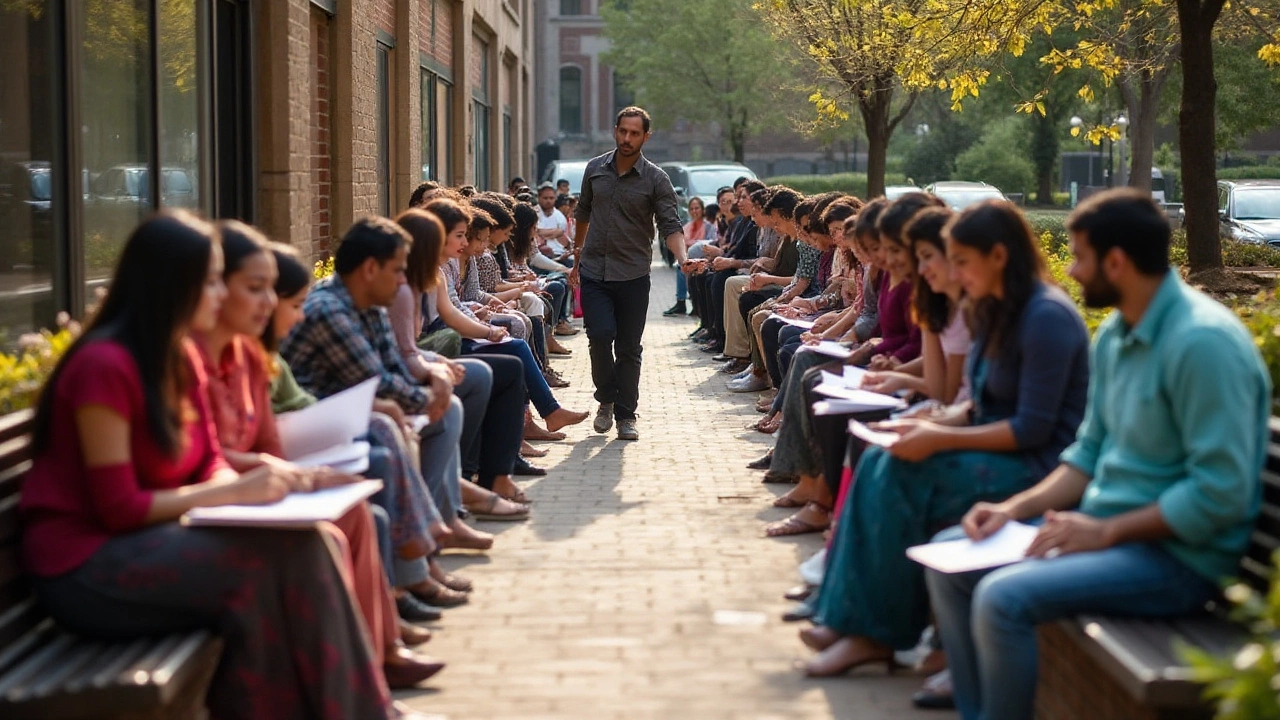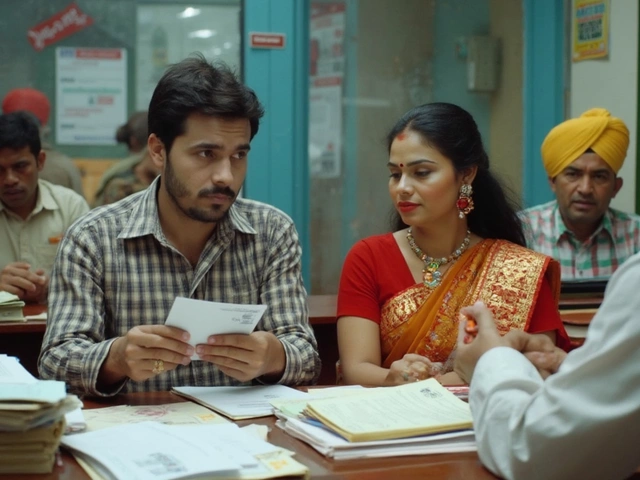Divorce can be an emotionally and financially draining process, but in Virginia, there are ways to untangle the legal ties without spending a fortune. Whether facing irreconcilable differences or simply needing a fresh start, navigating the complexities of divorce for free is possible by leveraging various tools and resources available statewide.
Understanding how to approach this journey involves familiarizing yourself with Virginia's divorce laws, effectively using court-provided documents, and exploring pro bono legal services. While doing it yourself requires patience and diligence, it can empower you to manage your divorce efficiently and without cost, leaving more resources for your future endeavors.
- Understanding Divorce Laws in Virginia
- Filing for Divorce: Required Forms and Documents
- DIY Divorce Process
- Legal Aid and Pro Bono Services
- Tips for a Smooth Divorce Process
- Finalizing Your Divorce
Understanding Divorce Laws in Virginia
In Virginia, the landscape of divorce laws is designed both to provide justice and to safeguard the interests of all involved parties. Before initiating the process, it is crucial to grasp what Virginia courts require and expect during a divorce. A key aspect is understanding the state's residency requirements. Either spouse must have lived in Virginia for at least six months before filing the divorce suit. This period ensures that the couple's relationship has a substantial connection to the state.
Virginia recognizes both fault and no-fault divorces. In a no-fault divorce, couples must prove that they have lived separately for an uninterrupted period of one year, though this reduces to six months if they have a property separation agreement and no minor children. On the other side, fault divorces can be pursued on grounds including adultery, desertion, cruelty, or conviction of a felony. Do note, a fault divorce can influence factors like alimony and division of property, often making the legal tussle more protracted.
Property and debt division is another battlefield in divorce. Virginia follows an "equitable distribution" approach, which means property and debts acquired during the marriage are divided fairly, not necessarily equally, among the spouses. It's the court's job to determine what is equitable, taking into account numerous factors like each party's monetary and non-monetary contributions, the duration of the marriage, and the circumstances surrounding the divorce.
"Divorce, at its core, isn't just the end of a relationship; it's a legal reshuffling of two lives that demands intricate navigation and clear understanding of the rules," says Margaret Collins, a renowned family law expert.
Child custody and support in Virginia are determined based on the best interests of the child. The courts aim for arrangements that foster continued contact with both parents. Custody can be sole or joint, and the amount of child support is calculated using the state’s guidelines which consider both parents' incomes, custody arrangements, and the child's needs.
The maze of divorce laws in Virginia also extends to specific processes and documents needed for filing. This includes the Complaint for Divorce, essential for initiating the legal process, and other documents like the Financial Declaration form, which plays a crucial role in assessing support claims. Understanding these documents and the legal pathway is vital to avoid missteps that could prolong or complicate the already challenging divorce process.
Filing for Divorce: Required Forms and Documents
Embarking on the journey of a divorce in Virginia requires a firm understanding of the necessary paperwork and what each document entails. One must commence by filling out the Bill of Complaint for Divorce, which is essentially the cornerstone of your divorce petition. This form outlines the grounds for seeking a divorce—be they based on separation, adultery, or other criteria recognized by Virginia law. Precise completion of this form sets the tone for your divorce proceedings.
According to Family Law Specialist, Jill Richards, "Clear and concise documentation is crucial, as even minor errors can lead to delays in your case proceedings."
Alongside the Bill of Complaint, the next step involves obtaining the VS-4 Form, a document critical for statistical reporting. It is often neglected, yet it serves an administrative purpose in the state’s record-keeping practices, necessary for validating the filing. Moreover, the grounds for the dissolution of marriage must be accurately stated on this form as well, ensuring consistency across documents.
Furthermore, initiating a no-cost divorce process also means understanding how to waive typical court fees. The Affidavit of Indigence, a key document, is specifically designed for this purpose. It involves a financial disclosure to the court that, if accepted, will exempt you from filing fees. It's imperative to provide accurate and honest details lest the waiver be revoked, which could complicate the divorce process further.
Having the Judgment for Absolute Divorce form ready is essential, as it ultimately formalizes the court’s decision. This document is prepared ahead of time and submitted to the judge once all pleadings are in alignment with the Virginia laws. This judgment serves as the final stamp on the dissolution of the marriage, ensuring both parties have acknowledged all terms laid out in their agreements or court orders.
Additional Considerations
An often-overlooked aspect is the role of the Relocation Notice, should there be any plans for geographic changes post-divorce, especially when children are involved. This notice is vital in keeping transparency between involved parties and ensuring that the court is updated with all movements for future implications.
For those navigating this process solo, many areas now host legal clinics that can guide on the accurate completion of these forms. While legal aid may be gratis, the insight provided is invaluable and can mean the difference between a straightforward dissolution and one fraught with missteps.
Here's a brief look at the essential documents:
- Bill of Complaint for Divorce
- VS-4 Form
- Affidavit of Indigence
- Judgment for Absolute Divorce
- Relocation Notice (if applicable)

DIY Divorce Process
Embarking on a ***DIY divorce*** in Virginia requires a commitment to understanding the legal framework and each step involved in the process. The first task is to determine whether you qualify for an uncontested divorce, which is typically the easiest and most cost-effective route. An uncontested divorce means both parties agree on all major issues such as property division, child custody, and support, which significantly simplifies the legal proceedings. This path is not only free of attorney fees but also empowers you to take control of your divorce from start to finish.
To start this journey, you will need to secure the necessary forms from the Virginia court, which include the Complaint for Divorce and the Acceptance/Waiver of Service of Process. These documents are available on the state's judicial website or can be obtained in person from the local circuit court. It is crucial to fill these forms out accurately to avoid unnecessary delays. Take the time to read each form carefully and ensure all information is recorded correctly. If you make mistakes, it might complicate your proceedings, prompting further court appearances or corrections.
A key step in the ***free divorce Virginia*** process is filing these forms with your local circuit court. Make sure to complete this step in the jurisdiction where either you or your spouse lives. Virginia requires that at least one of the parties has resided in Virginia for six months prior to filing. Once filed, you will need to serve your spouse with the divorce papers, which can be done via certified mail or using a process server. This service notifies them officially about the divorce proceedings, even if they already know about it. This ensures legal compliance and helps prevent future challenges to the process.
According to the Virginia Legal Aid Society, "DIY divorces are becoming increasingly popular as they allow individuals to have more control over their outcomes while saving on legal costs." This quote emphasizes the growing trend and acceptance of managing one's own divorce process.
After serving the papers, the next step is ensuring that both parties adhere to any court-mandated waiting periods. In Virginia, if you have no children under the age of 18, you must be separated for at least one year before you can be granted a divorce. However, if there are no children and both parties have a separation agreement in place, this period may be reduced to six months. During this waiting time, focus on preparing any additional documents required by the court and address any other legal matters that might arise. It is a strategic period to gear up for the final hearing, where a judge will review your case.
As the court date approaches, gather all necessary supportive documents and evidence to present your case thoroughly. Attending the court hearing is the final milestone in the DIY divorce process. At the hearing, both parties might be required to provide testimony regarding the agreement and confirm the facts about their marriage and separation. Once all information is reviewed and if everything is deemed in order, the judge will issue a divorce decree, officially ending the marriage. By following these detailed steps and keeping organized, one can navigate the complexities of a ***DIY divorce*** with a sense of assurance and clarity.
Legal Aid and Pro Bono Services
In Virginia, navigating the divorce process without professional help may seem intimidating, but there are many avenues for free divorce Virginia assistance that make the path smoother. Legal aid societies and pro bono services are essential allies for those who need legal help but lack the funds to hire a lawyer. Virginia hosts a variety of organizations dedicated to offering free or low-cost legal assistance to those who qualify based on income and other criteria.
One of the most reliable resources is the Virginia Legal Aid Society, which offers comprehensive support, from filing for a divorce to understanding court procedures. Their services are often extensive and come with the perk of being either free or on a sliding scale. This organization can be a crucial ally in your journey, providing support at a time when you might feel overwhelmed by the complexities of the legal system.
There are also numerous law schools in Virginia with clinics where budding legal minds practice under the supervision of seasoned attorneys. These clinics can be a valuable resource, offering detailed assistance and representing clients in court at no charge. Given their academic setting, they have access to a wealth of legal knowledge and resources that are available to you. This unique collaboration between students and instructors makes for an energetic and dedicated team working on your behalf.
The Virginia State Bar also operates a Pro Bono Program, encouraging attorneys to provide some services at no cost. This initiative ensures that legal aid isn't just the domain of certain institutions but a broader commitment by the legal community to serve those in need. It's important to reach out to them to understand which lawyers are available to take on such cases in your area.
Locating Legal Aid Resources
Accessing these resources starts with knowing where to look. Many legal aid societies have websites and hotlines where you can contact them directly. Often, a straightforward call or visit to their office can set you on the path to receiving the help you need. While the initial consultation may be brief, it typically provides a road map of the steps you'll need to follow to secure their services.
Another strategy involves attending free legal clinics hosted by various agencies throughout the state. These clinics not only offer direct legal advice but also workshops on completing necessary legal documents, understanding your rights, and even tips on managing post-divorce life. It's this expansive offering that makes them a strong pillar for supporting divorce seekers at no cost.
Virginia's commitment to ensuring access to justice is exemplified by its widespread legal aid and pro bono offerings. As quoted by a Virginia Bar Association member, "We believe the justice system should be open to everyone, not just those who can afford it."

Tips for a Smooth Divorce Process
Going through a divorce can be one of life’s most challenging transitions, but there are ways to make the experience more manageable and less tumultuous. One of the first steps is maintaining clear and open communication with your spouse, if possible. This lays a foundation for less contentious negotiations, especially when children are involved. Having these open lines can prevent misunderstandings and reduce emotional stress, creating a path that is less rocky and draining. Remember, your aim is to minimize conflict, not add fuel to the flames. In cases where direct communication is difficult, consider utilizing mediation services which can act as neutral grounds for discussions.
It is equally important to get organized early on in the process, gathering all necessary documents related to finances, properties, and shared responsibilities. This will not only make the legal proceedings smoother but also ensure that you're in control of your affairs. Having clear records of bank accounts, mortgages, debts, and any other financial matters can save time and prevent disputes later. Make lists of shared accounts and responsibilities to have a clear picture of what needs to be addressed during the legal proceedings. Staying organized also helps you to stay focused on practical issues rather than being overwhelmed by emotions.
"A successful divorce requires smart planning and the ability to think beyond the immediate pain," says David Stone, a renowned family law attorney, highlighting the importance of foresight in such personal matters.Depending on your situation, you might find it beneficial to seek educational resources such as workshops or support groups which can offer advice and a listening ear. Not only does this provide you with guidance and insight, but it also helps you understand that you are not alone. Platforms like these can significantly reduce the emotional weight of the process and allow you to take proactive steps towards rebuilding your life.
Another critical tip is to prioritize self-care throughout the divorce proceedings. It can be easy to get caught up in the chaos of legal battles and negotiations, but taking care of your mental and physical well-being is paramount. Establish routines that promote health and relaxation, such as regular exercise, a balanced diet, and sufficient sleep. Incorporating mindfulness and meditation practices can also help in managing stress and maintaining a clear mindset. The stronger and more centered you are personally, the better you will navigate the legal complexities ahead. In some cases, people have found success using creative outlets like art or journaling not only to express themselves but also to facilitate healing.
Lastly, stay informed about your legal options and rights throughout the divorce process in Virginia. This involves researching and understanding foundational legal terms and procedures, especially if you're pursuing a DIY divorce. You might encounter various procedural nuances specific to Virginia law, and being informed can prevent avoidable pitfalls. Utilize online legal databases and, if possible, consult legal professionals from pro bono services who can provide free advice. This knowledge not only reassures you that you are making well-informed decisions but also protects your interests as you move towards your new beginning.
Finalizing Your Divorce
Reaching the culmination of the divorce process in Virginia involves certain critical steps to ensure everything is legally binding and smoothly executed. This last stage is not just about crossing T's and dotting I's; it's about releasing yourself from the legal partnership effectively, so each party can move forward independently. After making it through the filing, form-completion, and potential court proceedings, you might think the end is near, but finalizing the divorce holds equal importance to initiate your new beginning.
Your path to finalizing the divorce starts with the submission of all required documents to the court if it hasn't been done yet. In Virginia, after the hearing and the court's agreement on the dissolution of marriage, parties must ensure that the divorce decree is properly recorded. Most counties will still require you to submit a signed and notarized VS-4 form, which helps update the state's vital records. Without this, logistical issues might arise, delaying the divorce finalization unnecessarily.
Depending on your case, attending a final hearing could be mandatory, especially if there are unresolved issues regarding property division or child custody. During this time, being prepared to discuss final matters clearly and concisely is imperative. A study by Virginia's Court Association highlights that when parties attend these hearings prepared, the likelihood of a swift resolution increases substantially. This is where all the information and negotiation finesse learned throughout the process come into play. Having the documents handy, rehearsing responses, or having legal support can smoothen the ride.
Once the judge issues the final decree, copies will be provided to both parties, typically via mail. This decree serves as official confirmation of the dissolution, with specifics on how assets are to be divided, terms of custody, support obligations, or any other court mandates. Remember, upon receipt, you should meticulously check every detail for accuracy. Discrepancies, however small, could lead to potential disputes or require amendments. As the saying goes, "The devil is in the details," ensuring documentation precision is pivotal at this stage.
"Finalizing a divorce is akin to putting the last piece in a jigsaw puzzle. Everything must align perfectly for the picture to emerge whole," says a renowned family law expert, highlighting the meticulous nature needed at this stage.
Moreover, after the decree is entered, it's beneficial to update personal records, like bank accounts or social security, to reflect your current status. Doing this promptly helps avoid any bureaucratic hiccups down the line. Also, reviewing any standing financial plans or beneficiaries is crucial. Without these updates, there could be lasting effects that disrupt your newly outlined life plans.
By concluding your marriage legally and effectively, you not only gain peace of mind but secure the framework for your individual future. The path may feel stacked with challenges, but finalizing your divorce correctly lays the groundwork for a fresh start, ensuring that no aspect is left unresolved, providing you the clean slate you aimed for.


